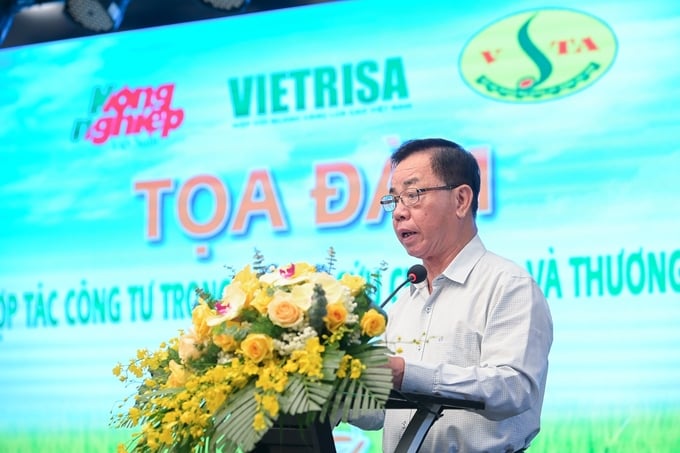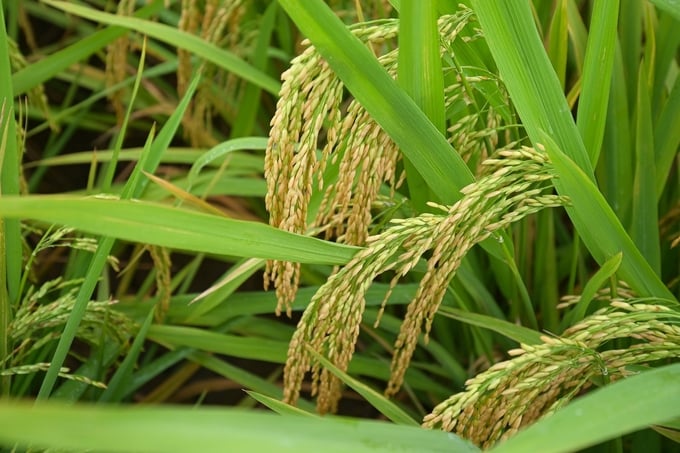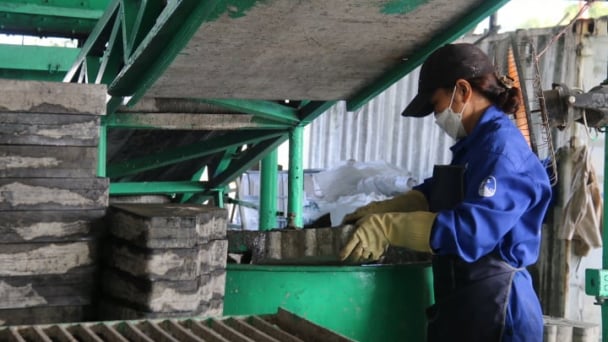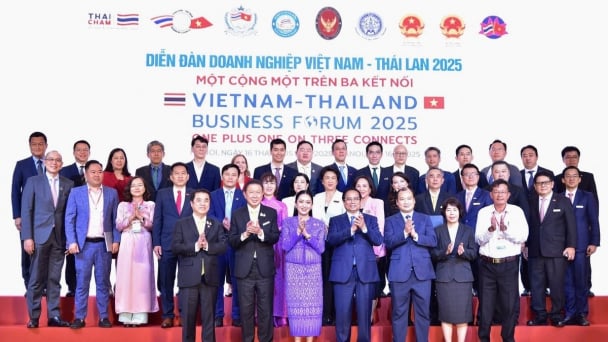May 19, 2025 | 13:21 GMT +7
May 19, 2025 | 13:21 GMT +7
Hotline: 0913.378.918
May 19, 2025 | 13:21 GMT +7
Hotline: 0913.378.918

Chairman of the Board of Directors of ThaiBinh Seed Group Joint Stock Company Tran Manh Bao proposed recommendations to remove difficulties in rice seed trade. Photo: Tung Dinh.
The seminar "Connecting and Collaborating between Public and Private Sectors in Rice Breeding Research and Commercialization" took place on the morning of May 31. The Vietnam Rice Industry Association, the Vietnam Plant Seed Trade Association, and the Vietnam Agriculture Newspaper organized it. Labor Hero Tran Manh Bao, Chairman of the Board of Directors of ThaiBinh Seed Group Joint Stock Company, presented the company's operational results from previous years and offered recommendations to overcome challenges in rice seed commercialization.
ThaiBinh Seed, founded in 1972, is a prominent firm in the agricultural research and technology sector. The organization possesses a total of 12 branches spread across the entire country, in addition to processing facilities, research institutions, and a national laboratory dedicated to evaluating seeds.
"Currently, the company's primary focus lies in conducting research strategies that aim to cultivate novel plant varieties with superior productivity and quality, as well as resilience in the face of natural conditions and climate change," underlined Mr. Tran Manh Bao.
ThaiBinh Seed's production linkage area nationwide currently spans around 8,000 hectares annually, with a procurement volume of 40,000 tons for farmers. ThaiBinh Seed's rice varieties dominate 70-80% of the production structure in Thái Bình province and make up 15-20% of the national rice seed structure.
ThaiBinh Seed has taken the lead and directed the execution of 45 national, ministerial, and provincial-level projects related to scientific research and breeding in the previous ten years. These projects had a budget of around 200 billion VND. Furthermore, there are approximately 20 high-level projects with an annual budget ranging from 8 to 10 billion VND.
In addition, ThaiBinh Seed has officially acknowledged a total of 20 new plant kinds for production up till now.
During the lecture, the Chairman of ThaiBinh Seed highlighted challenges and barriers associated with policies and systems governing plant breeding research, with a specific focus on rice breeding. More precisely, the allocation for scientific and technological endeavors remains constrained. Based on data from the Ministry of Planning and Investment as of July 2023, the allocation of funds for scientific research has experienced a progressive decline over the years, decreasing from 1.1% in 2017 to 0.82% in 2023.

ThaiBinh Seed's rice varieties account for over 70 - 80% of the production structure of Thai Binh province; accounting for 15 - 20% of the country's rice variety structure. Photo: Tung Dinh.
Moreover, the execution of projects and subjects that receive funding from the state budget entails numerous intricate procedures, and the financial mechanisms fail to incentivize research and development. Obtaining certification for scientific and technical items in scientific and technological organizations involves a multitude of steps.
Mr. Tran Manh Bao highlighted the inadequate protection of trademark and intellectual property rights for agricultural firms, especially in the domain of plant breeding, when it comes to the marketing of scientific and technological products.
In order to enhance the implementation of scientific tasks and the transfer of research products, the Chairman of ThaiBinh Seed suggests that the state should make adjustments, amendments, and additions to policies, thereby improving the public-private collaboration mechanism.
One strategy that has shown to be successful is to create a connection between the research that is carried out by public institutions and the requirements that are expressed by businesses. In order to accomplish this, it is necessary to ensure that the goods that are produced as a result of the research are in accordance with the requirements of the industry and to make use of the practical applications of the research outputs in both production and society. The extent to which scientific issues contribute to these objectives need to be the basis for evaluating the scientific topics that are being considered.
Furthermore, given the higher level of risk that is connected with the agricultural sector, it is very necessary to design and implement tax incentive programs that are specifically geared toward businesses that are engaged in the agricultural sector. In addition, it is of the utmost importance for the government to formulate policies that will enable the development of qualified individuals in private organizations by means of international training programs and expert training, with financial support.
Translated by Linh Linh

(VAN) The German Agricultural Society (DLG) explores the possibility of establishing a mechanization service center in Vietnam’s Mekong Delta to support farmers in accessing and utilizing advanced machinery.

(VAN) On May 16, the Department of Water Resources Management, in collaboration with the Food and Agriculture Organization of the United Nations (FAO), held a signing ceremony for the GEF-8 project document.

(VAN) Food safety, mechanization, vocational training, and market opening are key areas of cooperation expected between the Vietnamese Government and the Federal Republic of Germany.

(VAN) Deputy Minister Nguyen Quoc Tri also expressed his hope that Cuba will soon overcome its current challenges, attain food security, and further expand cooperation with Vietnam.

(VAN) The project contributes to enhancing the resilience of communities vulnerable to the impacts of climate change, with a primary focus on local women.

(VAN) Green materials help save energy and resources. However, after more than 10 years, Vietnam has only developed over 200 green buildings with more than 6 million square meters of floor space.

(VAN) Vietnam - Thailand Business Forum 2025: One plus one on three connects, marking a milestone in the comprehensive strategic partnership between the two nations.